|
Formula 1 racing has never been very popular in the United States, but it has a massive audience worldwide. It is generally accepted as the highest echelon of motorsport on the planet. It is marked by a level of technological sophistication unmatched on the ground. The closest comparison would be military fighter jets.
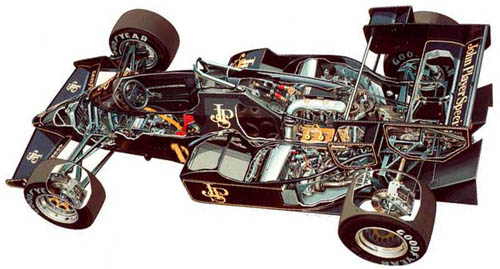
Races take place approximately very other weekend over the course of the season, with each event being held at a different, exotic location around the world. A race weekend is a massive spectacle draped in tradition and pageantry. Tens of thousands of people will descend on the location, creating a festive atmosphere of celebration. A Formula 1 race is no mere sporting event. It is an extravagant gala lasting three or more days.
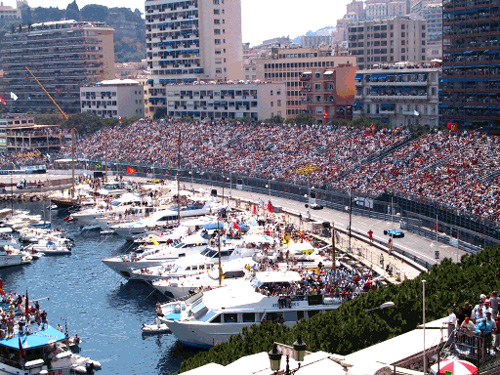
 The field of competitors is broken up into teams, with each team running two cars. Some are "factory" teams, like Renault, Toyota, and Ferrari, who manufacture the entire car themselves. Other teams are "independents," like Williams, McLaren, and Sauber. They manufacture all of the car except the engine, which they must procure from a major engine supplier, such as BMW, Mercedes and Honda. In either case, it is necessary to get sponsorship from corporations eager to get their logo in front of a worldwide audience, as budgets run into the hundreds of millions of dollars.
The field of competitors is broken up into teams, with each team running two cars. Some are "factory" teams, like Renault, Toyota, and Ferrari, who manufacture the entire car themselves. Other teams are "independents," like Williams, McLaren, and Sauber. They manufacture all of the car except the engine, which they must procure from a major engine supplier, such as BMW, Mercedes and Honda. In either case, it is necessary to get sponsorship from corporations eager to get their logo in front of a worldwide audience, as budgets run into the hundreds of millions of dollars.
 The final component of the car is the tires. Usually there are two tire manufacturers competing against each other, so half of the field will be running on one brand of tire and the other half on the other. At times there has been only one tire manufacturer, so the whole field will be running on the same brand of tire. In the early 2000's, Bridgestone put all their eggs in the Ferrari basket, focusing on their needs and ignoring the needs of other teams. More and more teams switched to Michelin, leaving Ferrari as practically the only team running on Bridgestones.
The final component of the car is the tires. Usually there are two tire manufacturers competing against each other, so half of the field will be running on one brand of tire and the other half on the other. At times there has been only one tire manufacturer, so the whole field will be running on the same brand of tire. In the early 2000's, Bridgestone put all their eggs in the Ferrari basket, focusing on their needs and ignoring the needs of other teams. More and more teams switched to Michelin, leaving Ferrari as practically the only team running on Bridgestones.
 Having teams of cars creates an interesting dynamic. Usually one teammate will be considered the primary driver and the other the secondary driver, based on seniority and skill. By and large teammates race against each other like any other competitor, but some teams have "team orders" whereby one driver may be ordered to take a specific action that he otherwise would not have taken. Ferrari is notorious for this. There have been many occasions where Ferrari's secondary driver has been leading the whole race, and at the very end of the very last lap he slows down and allows the primary driver to pass him and take the win. This can be grotesquely unpopular with the fans, not to mention the secondary driver, but it is allowed in the rules.
Having teams of cars creates an interesting dynamic. Usually one teammate will be considered the primary driver and the other the secondary driver, based on seniority and skill. By and large teammates race against each other like any other competitor, but some teams have "team orders" whereby one driver may be ordered to take a specific action that he otherwise would not have taken. Ferrari is notorious for this. There have been many occasions where Ferrari's secondary driver has been leading the whole race, and at the very end of the very last lap he slows down and allows the primary driver to pass him and take the win. This can be grotesquely unpopular with the fans, not to mention the secondary driver, but it is allowed in the rules.
 The governing body of Formula 1 is the Federation Internationale De L'automobile, or FIA. It is the FIA that establishes and enforces the rules that define F1. The FIA has ultimate, dictatorial (some might say tyrannical) control over the teams, who have little or no recourse against the FIA's decisions. This can cause a lot of friction. The FIA has pretty big britches, governing World Rally, Touring Car, GT, and many, many other international championships. American championships like NASCAR, Indy, and CART are purely domestic affairs and operate independently of the FIA.
The governing body of Formula 1 is the Federation Internationale De L'automobile, or FIA. It is the FIA that establishes and enforces the rules that define F1. The FIA has ultimate, dictatorial (some might say tyrannical) control over the teams, who have little or no recourse against the FIA's decisions. This can cause a lot of friction. The FIA has pretty big britches, governing World Rally, Touring Car, GT, and many, many other international championships. American championships like NASCAR, Indy, and CART are purely domestic affairs and operate independently of the FIA.
For Americans, apparently there isn't enough action in F1. Compared to other forms of racing, admittedly, there isn't a lot of passing on the track. In oval track racing, for example, people pass each other all the time. That's not the way that F1 works. It is possible, even common, for one car to be stuck behind a slower car but not be able to get by. To many people this is boring, but to those who appreciate what's actually going on, it's nail-biting suspense. And if the faster driver is able to make the pass, it is a jump-out-of-your-seat kind of a moment.
 A Formula 1 race track is a twisty, turny affair, with long straights, sharp bends, unsettling elevation changes, and tricky chicanes. The F1 cars are the quickest, most nimble vehicles that exist. The drivers are on the razor's edge every nanosecond that they're on track. They need to be absolutely 100% perfect all the time. For those who appreciate F1, that's where the excitement comes from. The slightest error can lose them position, or even cause them to spin out of the race. And if you spin out, there's no rejoining the action. Your day is through.
A Formula 1 race track is a twisty, turny affair, with long straights, sharp bends, unsettling elevation changes, and tricky chicanes. The F1 cars are the quickest, most nimble vehicles that exist. The drivers are on the razor's edge every nanosecond that they're on track. They need to be absolutely 100% perfect all the time. For those who appreciate F1, that's where the excitement comes from. The slightest error can lose them position, or even cause them to spin out of the race. And if you spin out, there's no rejoining the action. Your day is through.

There are many reasons why it is so difficult to pass on the track. One is that the cars are very evenly matched. While they're all developed independently, they must conform to the formula. This mitigates advantages that one team can have over another, and keeps them all largely on the same footing. Vehicle performance can differ by only tenths of a second per lap.
 If one car has a considerable advantage over another, it could be possible to actually get by him on a straightaway. But generally they're so closely matched that this won't work. The straightaway would have to be two miles long for the one car to inch past the other, even at excessive speeds. The most common means of passing is to out-brake the slower car into the bend at the end of the straightaway. This involves the handling superiority of one car over another, beyond a basic power superiority. It is also a very tricky maneuver. If the passing car isn't careful, he could over-shoot the turn and lose time or spin out of the race. And if he isn't careful, the two cars could collide, taking them both out of the competition.
If one car has a considerable advantage over another, it could be possible to actually get by him on a straightaway. But generally they're so closely matched that this won't work. The straightaway would have to be two miles long for the one car to inch past the other, even at excessive speeds. The most common means of passing is to out-brake the slower car into the bend at the end of the straightaway. This involves the handling superiority of one car over another, beyond a basic power superiority. It is also a very tricky maneuver. If the passing car isn't careful, he could over-shoot the turn and lose time or spin out of the race. And if he isn't careful, the two cars could collide, taking them both out of the competition.
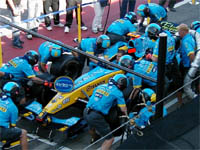 So many may wonder, if passing is so rare on the track, how do people move up in position? The answer is a process that is known as "passing in the pits." Suppose Driver A is stuck behind Driver B in a slower car. Driver B goes into the pits to fill up with gas and change tires. This allows Driver A to go as fast as he can until he too must make a pit stop. When he comes out of the pits, he will likely be ahead of Driver B, thus having passed him in the pits. This isn't as exciting as watching an actual pass on the track, but it can be very suspenseful as it will take several laps before the outcome is revealed. And if the cars are closely matched, it can be very exciting to watch the one car coming out of the pits as the other is racing down the straight towards the pit exit. If it's extremely close it can be very bit as exciting as watching a pass take place right on the track.
So many may wonder, if passing is so rare on the track, how do people move up in position? The answer is a process that is known as "passing in the pits." Suppose Driver A is stuck behind Driver B in a slower car. Driver B goes into the pits to fill up with gas and change tires. This allows Driver A to go as fast as he can until he too must make a pit stop. When he comes out of the pits, he will likely be ahead of Driver B, thus having passed him in the pits. This isn't as exciting as watching an actual pass on the track, but it can be very suspenseful as it will take several laps before the outcome is revealed. And if the cars are closely matched, it can be very exciting to watch the one car coming out of the pits as the other is racing down the straight towards the pit exit. If it's extremely close it can be very bit as exciting as watching a pass take place right on the track.
 In this way, a Formula 1 race can play out more like a game of chess than an old-fashioned horse race. There is a tremendous amount of strategy involved, based largely on when and how many times the car will need to pit. Team engineers can determine quite precisely on what lap a car will have to come into the pits, based on the amount of fuel they send it out with. Consider the above scenario. If Driver A had to pit before Driver B, then he would probably start lapping more slowly than Driver B, since he would be ladened with a full fuel load. So when Driver B pitted, he might well come out still ahead of Driver A, even though when they're equally ladened, Driver B is still slower. Getting it right requires a certain amount of science and analysis, a certain amount of prognostication, and a certain amount of luck.
In this way, a Formula 1 race can play out more like a game of chess than an old-fashioned horse race. There is a tremendous amount of strategy involved, based largely on when and how many times the car will need to pit. Team engineers can determine quite precisely on what lap a car will have to come into the pits, based on the amount of fuel they send it out with. Consider the above scenario. If Driver A had to pit before Driver B, then he would probably start lapping more slowly than Driver B, since he would be ladened with a full fuel load. So when Driver B pitted, he might well come out still ahead of Driver A, even though when they're equally ladened, Driver B is still slower. Getting it right requires a certain amount of science and analysis, a certain amount of prognostication, and a certain amount of luck.
To many people, this isn't racing. They don't like it and they won't watch it. They'd rather watch a bunch of church-going hillbillies drive cars 3-abreast around a big circle over and over again like rush-hour traffic. To them I say great. Fine. More power to you. Formula 1 might not have as much action lap for lap, but I feel that it has much greater intensity, and it's level of sophistication exceeds other forms of racing by light years. To me, that's what's important. I've never been one to follow the crowd anyway...
 |
Check out SpeedTV for Formula1 news and race coverage |
|
| Notable F1 Drivers |
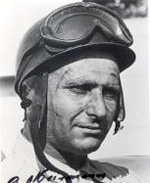 |
| Juan Manuel Fangio |
 |
Fangio was the original superstar of F1 in the modern era. He was the high-water-mark against which every other F1 driver would be measured, past, present, and future. He was World Champion in 1951, 1954, 1955, 1956, and 1957.
|
|
 |
| Jackie Stewart |
 |
Jackie Stewart enjoys tremendous name recognition, even here in the United States. I'm not sure why, but virtually everyone recognizes the name "Jackie Stewart" even if they don't know he was a Formula 1 driver. Maybe it was all the TV commercials he did. He was World Champion in 1969, 1971, and 1973.
|
|
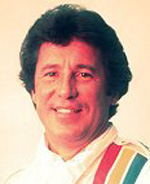 |
| Mario Andretti |
 |
Mario Andretti is the only American to ever be World Champion (in 1978). But he is an immigrant, so in my book it barely counts.
|
|
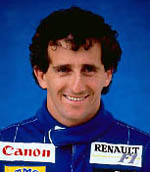 |
| Alain Prost |
 |
Nicknamed "The Professor," Prost was known for his cool and calculated driving style. He was one of the best drivers of all time. He was World Champion in 1985, 1986, 1989, and 1993.
|
|
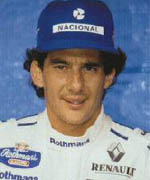 |
| Ayrton Senna |
 |
Senna, a contemporary of Prost's, was known for his hot temper and emotional driving style. In that way he was the antithesis of Prost. He was also one of the best drivers of all time (many would say THE best), and his rivalry with Prost is the stuff of legend. He was World Champion in 1988, 1990, and 1991.
|
|
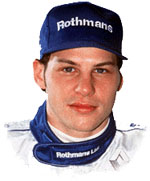 |
| Jacques Villeneuve |
 |
Jacques Villeneuve is best known for the greatest rookie year in the history of F1. He almost won his first race! That is unprecedented in F1. Only 53 drivers in the history of the sport even scored a point in their first race. Jacques wound up ranking second in the championship in his rookie year. The very next year, 1997, he was World Champion. It was as if he was born to drive F1 cars. Unfortunately after this meteoric rise he suffered a rapid and rather ignominious decline.
|
|
 |
| Michael Schumacher |
 |
Michel Schumacher has been dominating F1 for many years now, and has been trashing records left and right. He'll probably go down in history as the greatest of all time. I don't mean to begrudge him his accomplishments, but I really hate the guy. He's just so damn smug. While it is interesting to see a man so on top of his game that he can win an F1 race like he was driving to the corner store, it doesn't make for very interesting races. He's been World Champion too many times to bother citing here.
|
|
 |
| Fernando Alonso |
 |
Okay, it may be a bit premature to put Alonso in with the likes of the above names. But his career has gotten off to a great start. He was the youngest man to win an F1 race, and he's the first Spaniard to ever lead the championship. I expect great things from this handsome, affable young man.
|
|
Cars Index | Next Essay: World Rally Championship
|




 The field of competitors is broken up into teams, with each team running two cars. Some are "factory" teams, like Renault, Toyota, and Ferrari, who manufacture the entire car themselves. Other teams are "independents," like Williams, McLaren, and Sauber. They manufacture all of the car except the engine, which they must procure from a major engine supplier, such as BMW, Mercedes and Honda. In either case, it is necessary to get sponsorship from corporations eager to get their logo in front of a worldwide audience, as budgets run into the hundreds of millions of dollars.
The field of competitors is broken up into teams, with each team running two cars. Some are "factory" teams, like Renault, Toyota, and Ferrari, who manufacture the entire car themselves. Other teams are "independents," like Williams, McLaren, and Sauber. They manufacture all of the car except the engine, which they must procure from a major engine supplier, such as BMW, Mercedes and Honda. In either case, it is necessary to get sponsorship from corporations eager to get their logo in front of a worldwide audience, as budgets run into the hundreds of millions of dollars.
 The final component of the car is the tires. Usually there are two tire manufacturers competing against each other, so half of the field will be running on one brand of tire and the other half on the other. At times there has been only one tire manufacturer, so the whole field will be running on the same brand of tire. In the early 2000's, Bridgestone put all their eggs in the Ferrari basket, focusing on their needs and ignoring the needs of other teams. More and more teams switched to Michelin, leaving Ferrari as practically the only team running on Bridgestones.
The final component of the car is the tires. Usually there are two tire manufacturers competing against each other, so half of the field will be running on one brand of tire and the other half on the other. At times there has been only one tire manufacturer, so the whole field will be running on the same brand of tire. In the early 2000's, Bridgestone put all their eggs in the Ferrari basket, focusing on their needs and ignoring the needs of other teams. More and more teams switched to Michelin, leaving Ferrari as practically the only team running on Bridgestones.
 Having teams of cars creates an interesting dynamic. Usually one teammate will be considered the primary driver and the other the secondary driver, based on seniority and skill. By and large teammates race against each other like any other competitor, but some teams have "team orders" whereby one driver may be ordered to take a specific action that he otherwise would not have taken. Ferrari is notorious for this. There have been many occasions where Ferrari's secondary driver has been leading the whole race, and at the very end of the very last lap he slows down and allows the primary driver to pass him and take the win. This can be grotesquely unpopular with the fans, not to mention the secondary driver, but it is allowed in the rules.
Having teams of cars creates an interesting dynamic. Usually one teammate will be considered the primary driver and the other the secondary driver, based on seniority and skill. By and large teammates race against each other like any other competitor, but some teams have "team orders" whereby one driver may be ordered to take a specific action that he otherwise would not have taken. Ferrari is notorious for this. There have been many occasions where Ferrari's secondary driver has been leading the whole race, and at the very end of the very last lap he slows down and allows the primary driver to pass him and take the win. This can be grotesquely unpopular with the fans, not to mention the secondary driver, but it is allowed in the rules.
 The governing body of Formula 1 is the Federation Internationale De L'automobile, or FIA. It is the FIA that establishes and enforces the rules that define F1. The FIA has ultimate, dictatorial (some might say tyrannical) control over the teams, who have little or no recourse against the FIA's decisions. This can cause a lot of friction. The FIA has pretty big britches, governing World Rally, Touring Car, GT, and many, many other international championships. American championships like NASCAR, Indy, and CART are purely domestic affairs and operate independently of the FIA.
The governing body of Formula 1 is the Federation Internationale De L'automobile, or FIA. It is the FIA that establishes and enforces the rules that define F1. The FIA has ultimate, dictatorial (some might say tyrannical) control over the teams, who have little or no recourse against the FIA's decisions. This can cause a lot of friction. The FIA has pretty big britches, governing World Rally, Touring Car, GT, and many, many other international championships. American championships like NASCAR, Indy, and CART are purely domestic affairs and operate independently of the FIA.
 A Formula 1 race track is a twisty, turny affair, with long straights, sharp bends, unsettling elevation changes, and tricky chicanes. The F1 cars are the quickest, most nimble vehicles that exist. The drivers are on the razor's edge every nanosecond that they're on track. They need to be absolutely 100% perfect all the time. For those who appreciate F1, that's where the excitement comes from. The slightest error can lose them position, or even cause them to spin out of the race. And if you spin out, there's no rejoining the action. Your day is through.
A Formula 1 race track is a twisty, turny affair, with long straights, sharp bends, unsettling elevation changes, and tricky chicanes. The F1 cars are the quickest, most nimble vehicles that exist. The drivers are on the razor's edge every nanosecond that they're on track. They need to be absolutely 100% perfect all the time. For those who appreciate F1, that's where the excitement comes from. The slightest error can lose them position, or even cause them to spin out of the race. And if you spin out, there's no rejoining the action. Your day is through.
 If one car has a considerable advantage over another, it could be possible to actually get by him on a straightaway. But generally they're so closely matched that this won't work. The straightaway would have to be two miles long for the one car to inch past the other, even at excessive speeds. The most common means of passing is to out-brake the slower car into the bend at the end of the straightaway. This involves the handling superiority of one car over another, beyond a basic power superiority. It is also a very tricky maneuver. If the passing car isn't careful, he could over-shoot the turn and lose time or spin out of the race. And if he isn't careful, the two cars could collide, taking them both out of the competition.
If one car has a considerable advantage over another, it could be possible to actually get by him on a straightaway. But generally they're so closely matched that this won't work. The straightaway would have to be two miles long for the one car to inch past the other, even at excessive speeds. The most common means of passing is to out-brake the slower car into the bend at the end of the straightaway. This involves the handling superiority of one car over another, beyond a basic power superiority. It is also a very tricky maneuver. If the passing car isn't careful, he could over-shoot the turn and lose time or spin out of the race. And if he isn't careful, the two cars could collide, taking them both out of the competition.
 So many may wonder, if passing is so rare on the track, how do people move up in position? The answer is a process that is known as "passing in the pits." Suppose Driver A is stuck behind Driver B in a slower car. Driver B goes into the pits to fill up with gas and change tires. This allows Driver A to go as fast as he can until he too must make a pit stop. When he comes out of the pits, he will likely be ahead of Driver B, thus having passed him in the pits. This isn't as exciting as watching an actual pass on the track, but it can be very suspenseful as it will take several laps before the outcome is revealed. And if the cars are closely matched, it can be very exciting to watch the one car coming out of the pits as the other is racing down the straight towards the pit exit. If it's extremely close it can be very bit as exciting as watching a pass take place right on the track.
So many may wonder, if passing is so rare on the track, how do people move up in position? The answer is a process that is known as "passing in the pits." Suppose Driver A is stuck behind Driver B in a slower car. Driver B goes into the pits to fill up with gas and change tires. This allows Driver A to go as fast as he can until he too must make a pit stop. When he comes out of the pits, he will likely be ahead of Driver B, thus having passed him in the pits. This isn't as exciting as watching an actual pass on the track, but it can be very suspenseful as it will take several laps before the outcome is revealed. And if the cars are closely matched, it can be very exciting to watch the one car coming out of the pits as the other is racing down the straight towards the pit exit. If it's extremely close it can be very bit as exciting as watching a pass take place right on the track.
 In this way, a Formula 1 race can play out more like a game of chess than an old-fashioned horse race. There is a tremendous amount of strategy involved, based largely on when and how many times the car will need to pit. Team engineers can determine quite precisely on what lap a car will have to come into the pits, based on the amount of fuel they send it out with. Consider the above scenario. If Driver A had to pit before Driver B, then he would probably start lapping more slowly than Driver B, since he would be ladened with a full fuel load. So when Driver B pitted, he might well come out still ahead of Driver A, even though when they're equally ladened, Driver B is still slower. Getting it right requires a certain amount of science and analysis, a certain amount of prognostication, and a certain amount of luck.
In this way, a Formula 1 race can play out more like a game of chess than an old-fashioned horse race. There is a tremendous amount of strategy involved, based largely on when and how many times the car will need to pit. Team engineers can determine quite precisely on what lap a car will have to come into the pits, based on the amount of fuel they send it out with. Consider the above scenario. If Driver A had to pit before Driver B, then he would probably start lapping more slowly than Driver B, since he would be ladened with a full fuel load. So when Driver B pitted, he might well come out still ahead of Driver A, even though when they're equally ladened, Driver B is still slower. Getting it right requires a certain amount of science and analysis, a certain amount of prognostication, and a certain amount of luck.
















